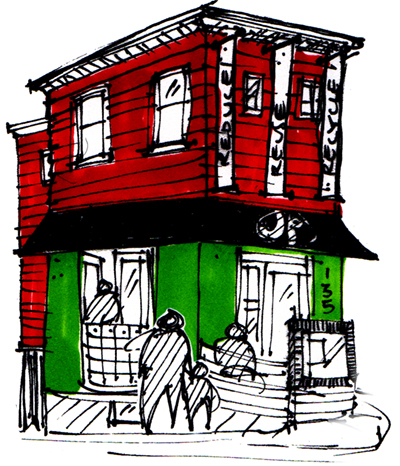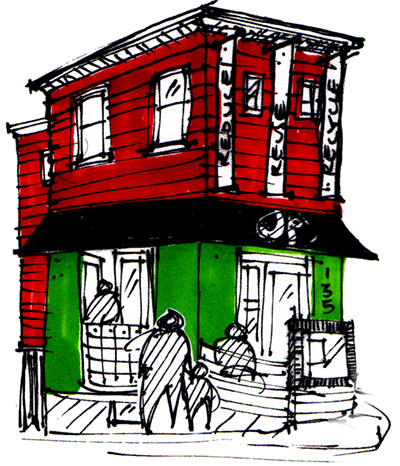
I don’t dislike No Impact Man. He is more intentionally political than his detractors portray him to be, and I think his yearlong stunt of living without toilet paper in NYC has been eye-opening for a lot of people, and amusing for many others. I admit that the “happy green” genre of books that are appearing a lot now, exemplified by Sleeping Naked is Green (by Vanessa Farquharson), make me nauseous: a hot twentysomething journalist makes sacrifices such as “buying only green cosmetics” while traveling to eco-resorts by plane and making amends with carbon offsets. But I was, until recently, a less ostentatious personification of the same middle-class green guilt, and I understand the way we anxiously try to bargain with our angry planet by promising to be better consumers. No one wants to admit that we may not be consumers at all in a few years.
What I want to point out here is that simple living, simple people, are everywhere, and always have been. We recognize the extreme varieties: back-to-the-land types, monastics, Mother Teresa and Ralph Nader, not to mention the homeless, addicts, that crazy lady who takes in all the stray cats. Really they live among us, quite unobtrusive in most cases, and most of them are sane.
My friend Catherine has worked all her adult life in administrative jobs, minimizing her material needs and ignoring most external definitions of success, in order to write poetry. She’s needed to get off the computer for health reasons lately, and is diligently working to set up a small business as a personal organizer (if you’re in Boston and having trouble finding your passport in that firetrap you call your office, check out Catherine’s services at ARoomofOnesOwnOrganizing.com). Another friend, Rick Zemlin, lives on $10,000 a year in San Diego. He feels that working more than 20 hours/week is unhealthy and leaves no room for his spiritual development, which is the focus of his very intentional life. Rick doesn’t write a snappy blog, or have a book contract that I know of, but his Facebook posts are honest and detailed. He did write a disarming article for his church newsletter, detailing his personal expenses, and he’s allowing me to cite it here.
Current Annual Personal Consumption Expenses
5,200 Rent & utilities (bedroom in a 2 bedroom apt. in high-priced California. House phone. No cell.)
1,500 Food (lacto-ovo vegetarian, with an emphasis on good nutrition)
100 Misc household and personal items
100 Clothes (thrift stores provide all of my clothing)
1,000 Health care & supplements (no health insurance)
750 Transportation (public transit fares & tennis shoes. No car)
500 Recreation (movies, eating out, retreats, coffee shops, etc.)
650 Travel: to see family & friends
550 Gifts consumed (items received gratis & low income medical discounts)
—– 10,350
I say disarming because Rick’s expenses are remarkably low. He has obviously given up much of what defines the rest of us, including owning a home and having children. But he has a special clarity and warmth, and he seems to be enjoying his life as much as anyone I know. Here’s Rick’s philosophy: “I believe we are each on a journey with our Creator, moving deeper and deeper into the gift of our lives — into the fullness of living. This core life purpose of living fully is joined by a second one, equally important: to help create a world where all are able to do so — a world in which all 6.8 billion of us can thrive. I see this thriving world as the Grand Dream that God holds for us. I believe that we are given all that we need to live into this vision for the world, and that because God is infinitely patient with us we will eventually arrive. It is our destiny, our home. It’s going to cost us, though. (And I think we will gladly pay … one day.)” Read Rick’s full article here.
I learned a lot about the relative definitions of prosperity by living in Europe in my twenties. (Czechoslovakia, 1990-92, the Czech Republic 1992-95. Same town, same apartment.) When I arrived, shortly after the Velvet Revolution in 1989, a four-member family was typically living in a high-rise apartment with one or two bedrooms. No kudos to the repressive and corrupt regimes of communist Eastern Europe, but material prosperity was adequate, and no one seems much happier 20 years later now that they all have new cars and TVs and debt.
These friends, these memories of other places, and my own experiences of living out of a car or a backpack, are comforting to me now in moments when I’m anxiously scrutinizing the household budget, or wondering where that last 30k we need for the house is going to come from. I remember to breathe deeply and recite my mantra, “In the end, it’s six by six and nothing more.”


